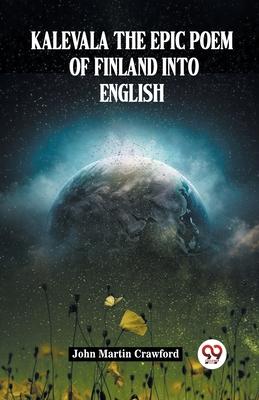The Kalevala is an epic poem from Finland that tells the story of the Finnish people, their mythology, and their struggles. The poem was compiled and written by Elias Lönnrot, a Finnish physician and folklorist, in the 19th century. The Kalevala is considered a national epic of Finland and has had a profound influence on Finnish culture and identity. John Martin Crawford translated the Kalevala into English in the late 19th century. His translation is still considered one of the most influential and widely read translations of the poem in English. Crawford’s translation was published in two volumes and contains all 50 cantos of the Kalevala. The Kalevala is divided into two main parts. The first part tells the creation story of the world according to Finnish mythology, including the birth of the hero Väinämöinen and his struggles against the evil witch Louhi. The second part of the poem focuses on the heroism and adventures of various other heroes, including Ilmarinen, Lemminkäinen, and Kullervo. Throughout the poem, themes of magic, nature, and the power of language are prominent. The Kalevala also contains numerous references to Finnish folklore, including stories of the mysterious shamanistic figure known as the "sampo." The Kalevala has been translated into dozens of languages and has had a significant impact on Finnish literature, music, and art. It remains an important cultural touchstone in Finland and continues to inspire artists and writers around the world.
| FindBook |
有 1 項符合
Kalevala The Epic Poem Of Finland Into English的圖書 |
 |
Kalevala The Epic Poem Of Finland Into English 作者:Martin Crawford 出版社:Double 9 Books 出版日期:2023-02-01 語言:英文 規格:平裝 / 636頁 / 21.59 x 13.97 x 3.58 cm / 普通級/ 初版 |
| 圖書館借閱 |
| 國家圖書館 | 全國圖書書目資訊網 | 國立公共資訊圖書館 | 電子書服務平台 | MetaCat 跨館整合查詢 |
| 臺北市立圖書館 | 新北市立圖書館 | 基隆市公共圖書館 | 桃園市立圖書館 | 新竹縣公共圖書館 |
| 苗栗縣立圖書館 | 臺中市立圖書館 | 彰化縣公共圖書館 | 南投縣文化局 | 雲林縣公共圖書館 |
| 嘉義縣圖書館 | 臺南市立圖書館 | 高雄市立圖書館 | 屏東縣公共圖書館 | 宜蘭縣公共圖書館 |
| 花蓮縣文化局 | 臺東縣文化處 |
|
|
圖書介紹 - 資料來源:博客來 評分:
圖書名稱:Kalevala The Epic Poem Of Finland Into English
|











